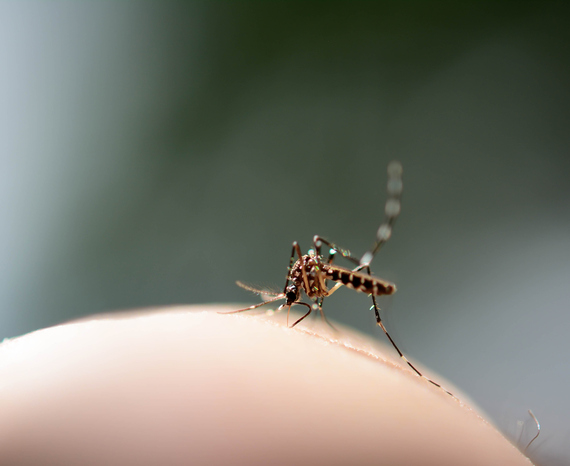By John Swartzberg, M.D.
Recently, I got a call from a young woman who is planning her wedding. She and her fiancée have booked a honeymoon in South America, but with outbreaks of the mosquito-borne Zika virus, she's rethinking her plans.
"Should we go?" she asked me. "We're planning on trying to get pregnant, but probably not for at least six months after the wedding. Would that be safe?"
What she wanted was an absolutely certain answer -- and that's something I couldn't give her. Zika virus has been linked to cases of microcephaly in newborns whose mothers were infected while pregnant. Based on everything we know about how viruses behave, and about Zika in particular, it seems very unlikely that getting pregnant six months after a honeymoon in Latin America or the Caribbean would pose any risk to her unborn baby. But can I tell her with 100 percent certainty that she's perfectly safe? No.
Get answers to Urgent Questions about Zika Virus.
What we know about Zika continues to evolve. And recommendations from the best experts about travel, testing, and pregnancy continue to change. Here's what we do know -- or at least what we're pretty sure of -- as of the time I'm writing this:
For U.S. residents, Zika is primarily a travel-acquired disease.
As of late March, the Centers for Disease Control and Prevention (CDC) reported 312 cases of Zika virus in the United States, all acquired during travel. Of those, 27 were pregnant women.
No one has developed "locally acquired" Zika in the U.S. Now, it's likely that as the weather gets warmer we will see cases crop up, especially in the southern parts of United States -- south Florida, the Gulf Coast or Baja California. But Aedes aegypti, the mosquito that carries Zika, as well as other viruses like dengue fever and chikungunya, does not over-winter well outside tropical and sub-tropical climates, so we don't expect large local outbreaks of the disease in the United Sates.
For most people, Zika is a mild disease.
Only about 20 percent of people infected with the virus actually become ill. The most common symptoms are fever, rash, joint pain, and redness in the eyes. It's usually mild, with symptoms lasting for a few days to a week.
The mildness, of course, is a double-edged sword: Because many people show no symptoms at all, and others may mistake the symptoms for a slight case of flu. So it's possible not to realize that you've been infected with the virus. And while experts believe that the incubation period -- the time between being bitten by an infected mosquito and showing signs of being ill -- is probably between three days to a week, they don't know for sure.
Zika has been linked to microcephaly.
Microcephaly is a birth defect in which the baby's head size is smaller than expected, often a sign of abnormal brain development. The relationship between the Zika virus and birth defects such as microcephaly is still not well understood, but the evidence is mounting that there is a direct connection:
- Researchers have found the virus in the brain tissue and amniotic fluid of babies and stillborn fetuses with microcephaly whose mothers had Zika during pregnancy.
Teams of scientists from CDC are now in Brazil, where the connection was first identified, working with local health officials to conduct the first large-scale investigation into Zika and microcephaly.
That research will take time. We now know that when a woman becomes infected with rubella, also known as German measles, during her first trimester of pregnancy, her baby has up to an 80 percent chance of being born with a wide range of birth defects -- including deafness, eye defects, heart defects, and cognitive impairments -- known as congenital rubella syndrome. But it took more than a decade for that link to be definitively verified.
We are likely to know still more about Zika and microcephaly in May, when two "case control" studies are expected, but the World Health Organization has said that it's likely to be closer to six months before we can say with some certainty that there is a direct connection.
So what should you do until then?
If you're pregnant or want to become pregnant soon, you should postpone travel to Zika outbreak areas.
The CDC's most current recommendation is that pregnant women in any trimester delay trips to any area where the Zika virus is spreading.
If your partner is pregnant, postpone travel to Zika outbreak areas or use protection when you return.
Men who have traveled to a Zika-infected area are cautioned to abstain from sex or use a condom if their partner is pregnant for at least eight weeks -- Zika can be spread through sexual contact.
If you have already traveled to a Zika-affected area, get tested.
If you are pregnant and have already traveled to a place where Zika is spreading, the CDC recommends that you have a blood test. This is especially important if you've developed any of the symptoms of Zika infection during your trip, or within two weeks after returning.
Delay donating blood if you have traveled to a Zika-affected area.
The Red Cross has also asked people who have traveled to Mexico, the Caribbean, or Central or South America to defer donating blood or platelets until 28 days after their return. The virus is typically only found in the blood for a week to ten days after exposure, but they are acting with an abundance of caution in order to protect the blood supply.
Regardless of travel, protect yourself from mosquitoes, especially if pregnant.
Be vigilant against mosquito bites, particularly if you live in a warm climate. That means:
- Wear long-sleeved shirts and pants.
- Treat clothing with the mosquito repellent permethrin.
- Stay in places with air conditioning and/or window screens, or sleep under mosquito netting if that's not possible.
- Regularly reapply insect repellent. EPA-registered insect repellents are safe for use during pregnancy.
I wish I could provide more definite, absolute answers, but at this point, even the experts don't have nearly as much information as we wish we had. Nature always has a way of surprising us. The most prudent advice I have, if you have been in a Zika-affected area recently or have plans to travel to one of those areas, is to check the CDC Zika website regularly, and follow their recommendations. Also, consult with a doctor who is knowledgeable about this disease -- an infectious diseases expert who is board certified by the Infectious Disease Society of America.
- How to Prevent Mosquito Bites
- Let's connect on Facebook!
John Swartzberg, M.D., is chair of the editorial board of BerkeleyWellness.com and the UC Berkeley Wellness Letter.
Follow Berkeley Wellness on Twitter.


